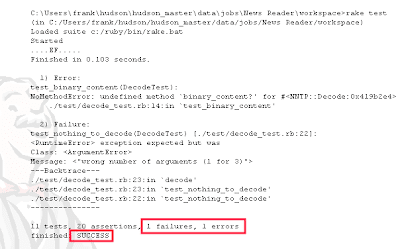The "Walking the Talk" project is well underway. My progress has been brisk and I'm learning quite a bit along the way. The simplicity of Ruby is a gift, allowing me to understand the concepts involved without getting bogged down by endless details.
Several tools were left out of the quality sandbox sandbox last time.
RDoc (source-embedded documentation ala JavaDoc) and
Log4r (logfile support ala Log4J) are both useful tools for the agile developer. I'm still learning some of the finer points of each, but both were up and functioning at a basic level in no time. Expect to hear more about these in a future post.
HudsonHudson continues to be awesome. I just read on
Kohsuke Kawaguchi's Blog that Hudson and his other projects he's been doing in the background are going to become his day job. This is exciting news for Hudson fans! The brisk development pace will likely accelerate further.
TDDI had an epiphany several months ago in our AgileNM meeting about TDD. A member said that TDD significantly reduced the
cyclomatic complexity of the code. Ah, TDD is not about having better tests, it is about writing better code! I'll relate my personal experience with this a little later, but let's just say for now that my personal experience has only increased my enthusiasm! Take a look at
this paper from David Jansen of the University of Kansas for more background.
rcov rcov
rcov pretty much worked as expected. There were only two ways that it fell short of the standard set by Cobertura for me. The first was the lack of hit counts for each line. I found this interesting to understand where the hot spots in the code might be even before firing up a profiler.
The other shortcoming of rcov compared to Cobertura is that it does not include cyclomatic complexity analysis. After a little Googling, it appears that
Saikuro fills that gap. I will report on it as soon as I get a chance to play with it.
TracTrac was the biggest disappointment of the bunch. One area where Ruby leaves Python in the dust is in package management. I had to install so many different packages and take so many manual steps just to get something that sort of worked. Compared to
RubyGems projects, this is an absolute joke. I couldn't get either of the plugins I installed to work.
The good news is there will soon be an excellent issue tracker/wiki available.
Confluence, the wiki we use at work, already has a personal edition available. With the 4.0 release of JIRA (date not announced yet) there will be a
personal edition of JIRA as well. Both are from
Atlassian, who are fantastic to work with. Goodbye Trac, it was fun knowing you, but I want to spend more time developing my app and less time screwing around with plugins.



